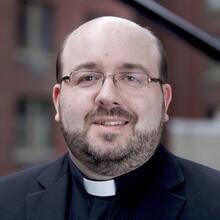Find today’s readings here.
Today, the first reading recounts the conclusion of the Council of Jerusalem, a narrative that occupies most of the 15th chapter of Acts. After a controversy over whether or not Gentile converts had to be circumcised and observe the full Mosaic law, the conclusion is that “we ought to stop troubling the Gentiles who turn to God,” and only a small set of requirements are imposed upon them. In the selection in the Lectionary today, a letter announcing this decision is sent from the church in Jerusalem to the Gentile Christians in Antioch, delivered by Judas and Silas, accompanying Paul and Barnabas back to Jerusalem.
And so far as it goes, this narrative is consoling, hopeful and relatively straightforward. There has been an understandable debate over a complex question; people consulted and reached a reasonable decision; that decision was communicated clearly and swiftly. “It is the decision of the Holy Spirit and of us”—what a turn of phrase!—and “when the people read it, they were delighted with the exhortation.”
So there we are.
Except…except, if you have ever been involved in an argument between family or close friends, or a debate at, say, your parish council, you have likely had the experience of hearing multiple people recount their versions of how the conversation went. And you know that even when the final story is presented as smooth and serene, gliding across the surface of the pond, below the waterline, the duck’s feet are paddling madly.
Scripture, in God’s providence, records another version of this story, as Paul relates in the second chapter of the Letter to the Galatians. Paul is a bit more worked up, incensed with the “false brothers secretly brought in, who slipped in to spy on our freedom that we have in Christ Jesus.” He tells the Galatians that he argued in Jerusalem for the truth of the Gospel he first proclaimed to them, and that “those who were reputed to be important (what they once were makes no difference to me; God shows no partiality)—those of repute made me add nothing.”
And as I imagine Paul might have said to those who were arguing against him: So there.
But here’s the thing: The truth we read is from the inspiration of Scripture which records both these versions of this story, both the viewpoint of Paul and the more cleaned-up narrative of the council smoothly reaching a decision. This is precisely what it means to say, as Acts recounts the letter from Jerusalem saying to the church in Antioch, “It is the decision of the Holy Spirit and of us…”
There are stories being told and retold on top of each other as we all continue to keep the faith and hand it on to the next generation of the church. Right on down to the messiness of family arguments and parish council meetings today.
From the very beginning, the church reaches decisions that are complicated, human, messy, often ad hoc—this is what the Holy Spirit protecting and guiding the church looks like. It doesn’t look just like Acts 15; nor does it look just like Galatians 2. It looks like both Acts 15 and Galatians 2 telling the same story in overlap with each other. There is one Holy Spirit, one faith, and one church, but there is not one master narrative of how it all plays out. There are stories being told and retold on top of each other as we all continue to keep the faith and hand it on to the next generation of the church. Right on down to the messiness of family arguments and parish council meetings today.
If we keep reading a bit further past today’s story, we see that the messiness keeps on going. In Acts, chapter 15 concludes by describing how Paul and Barnabas, who had been completely united in representing the church of Antioch in Jerusalem, separated over Barnabas’ desire to take Mark with them, whom Paul did not trust after a previous disagreement. In Galatians, Paul goes on to explain how he rebuked Peter over his inconsistency about allowing himself to eat with the Gentiles “until some people came from James.”
This is what it means to believe that the Scripture is inspired and the Holy Spirit is at work in the church. In all this, “It is the decision of the Holy Spirit and of us…”
When you read, as you no doubt will, here in America, about the inevitable messiness and confusion and multiple versions of the conversation that surround this fall’s meeting of the Synod on Synodality, remember today’s reading from Acts. It is, mysteriously and providentially, the decision of the Holy Spirit that the church operates this way. And it is our decision, as well, to recognize and proclaim that in the midst of our messiness and overlapping stories, the Holy Spirit is at work.








